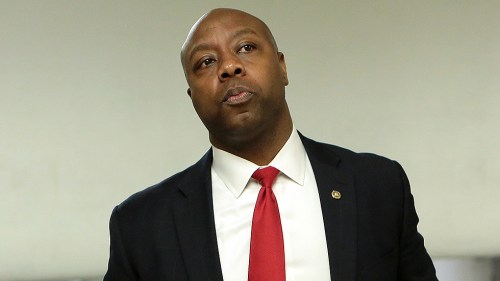What is the 14th Amendment? Why do some think it could be used against Trump?
Several experts, lawmakers and activists are putting forward a legal argument that former President Trump could be disqualified from the 2024 ballot under the 14th Amendment for his alleged actions in connection to the Jan. 6, 2021, attack on the Capitol.
At the center of the argument is Section 3 of the 14th Amendment — a Reconstruction-era clause aimed to prevent those who held roles in the Confederacy from becoming a member of Congress or of other elected offices.
Here’s what you should know about the amendment:
What does Section 3 of the 14th Amendment mean?
Section 3 of the 14th Amendment was ratified in 1868, following the Civil War, to outline the criteria for disqualifying someone from office.
It states:
“No person shall be a Senator or Representative in Congress, or elector of President and Vice-President, or hold any office, civil or military, under the United States, or under any State, who, having previously taken an oath, as a member of Congress, or as an officer of the United States, or as a member of any State legislature, or as an executive or judicial officer of any State, to support the Constitution of the United States, shall have engaged in insurrection or rebellion against the same, or given aid or comfort to the enemies thereof. But Congress may by a vote of two-thirds of each House, remove such disability.”
How might it be used against Trump?
Some legal scholars have suggested Section 3 could be applied to the former president using the same arguments as in the Reconstruction Era.
Proponents of the argument suggest Trump may be disqualified from serving as president because of actions he allegedly took to remain in power after leaving the White House. They say those alleged actions fall under either engaging in insurrection against the Constitution or assisting others, resulting in him being disqualified from the ballot.
Has this argument been used before?
The legal argument for barring someone from office under this amendment has rarely been used since the period immediately following the Civil War. It has not been used to disqualify a presidential candidate.
Some of those in favor of using the amendment against Trump have pointed to a New Mexico official who was ordered to be removed from office last year over his participation in the Jan. 6 attacks. New Mexico District Court Judge Francis J. Mathew said “Cowboys for Trump” founder Couy Griffin’s decision to join the mob on Jan. 6 and trespass on restricted grounds constituted insurrection and disqualified him from holding federal or state office.
Citizens for Responsibility and Ethics in Washington (CREW), a Washington, D.C.-based watchdog group, said it was the first time since 1869 that a court disqualified an elected official over the insurrection rule.
The argument has also been made by a liberal group, Free Speech for People, to attempt to disqualify former Rep. Madison Cawthorn (R-N.C.) and Rep. Marjorie Taylor Greene (R-Ga.) from running for office last year. Cawthorn’s case became moot after he lost his primary.
A judge ruled Greene was eligible to run for reelection last year, saying that the group that filed the lawsuit citing the amendment did not produce sufficient evidence that Greene’s actions before, during and after the attacks on the Capitol helped an insurrection that violated the Constitution.
Who is floating the 14th Amendment idea?
A growing number of Democrats, activists and even GOP presidential candidates have begun to back the idea. It gained attention after former federal Judge J. Michael Luttig and constitutional lawyer Laurence Tribe wrote an article for The Atlantic last month arguing the 14th Amendment could be used against the former president.
Two civil rights organizations have launched a campaign to push state governments to disqualify the former president from the ballot on 14th Amendment grounds.
Has any legal action been taken?
CREW filed a lawsuit Wednesday aiming to block Trump from the 2024 ballot in Colorado. The group alleged that Trump violated the oath of office by “recruiting, inciting and encouraging a violent mob that attacked the Capitol on January 6, 2021 in a futile attempt to remain in office.”
A Florida lawyer also filed a challenge to Trump’s ability to run for the White House last month on 14th Amendment grounds.
What are people saying about it?
Sen. Tim Kaine (D-Va.) and Rep. Adam Schiff (D-Calif.) both said Sunday the 14th Amendment may disqualify Trump from the election. GOP presidential candidate Asa Hutchinson has also said the former president’s alleged actions Jan. 6 likely violated the amendment.
Others are pushing back on this idea, saying state officials do not have the power to keep Trump off the ballot over the 14th Amendment. Arizona’s Secretary of State Adrian Fontes (D) said he did not have the power to bar Trump from the ballot last month.
Georgia Secretary of State Brad Raffensperger (R) also argued against invoking the amendment, saying that the issue should be left to the voters.
The Wall Street Journal’s editorial board criticized the push to keep the former president off the ballot, noting Trump has not been charged with inciting or engaging in an insurrection. The board, along with other critics of the 14th Amendment argument, also said Trump’s alleged actions after the 2020 election do not meet the constitutional definition of “insurrection.”
Trump also dismissed the argument in a Truth Social post Monday, saying it has “no legal basis or standing” in connection to the 2024 election.
Copyright 2023 Nexstar Media Inc. All rights reserved. This material may not be published, broadcast, rewritten, or redistributed. Regular the hill posts












